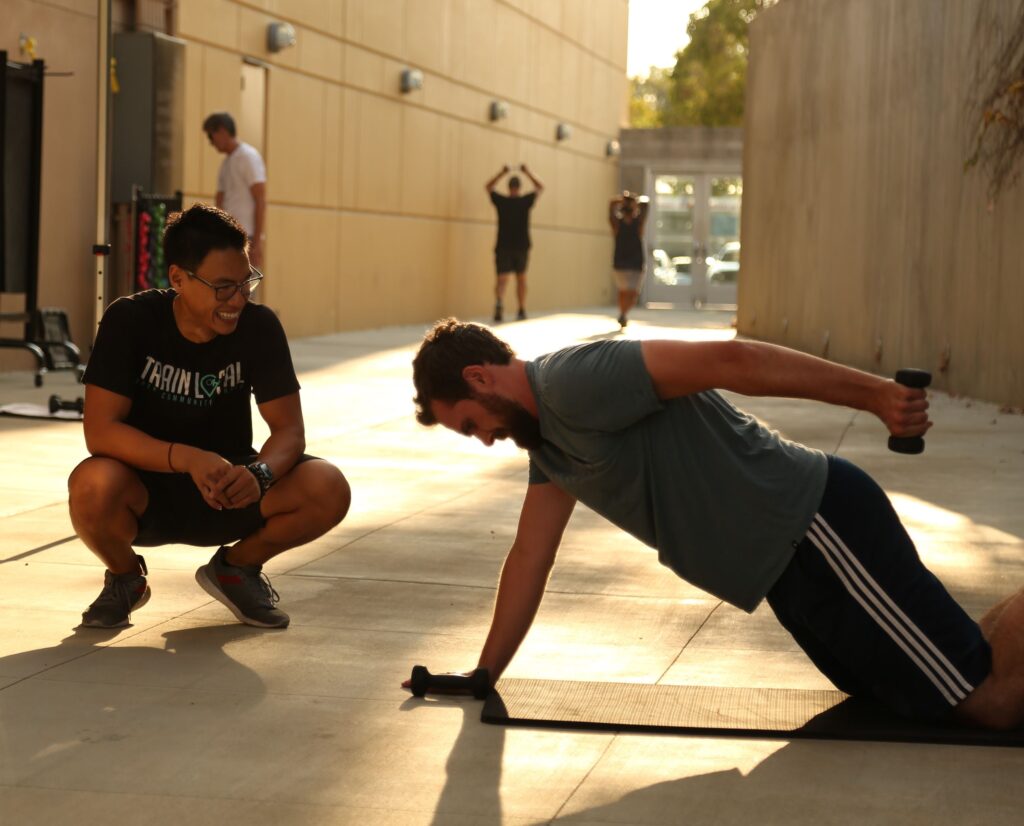Fitness requirements are the same across all ages. Regardless of age, everyone requires the same level of fitness.
Maintaining good health and fitness is important at every stage of life. Whether you’re a young adult or a senior citizen, taking care of your physical well-being is crucial. Fitness requirements, which include exercise, proper nutrition, and sufficient rest, apply to individuals of all ages.
Regular physical activity helps with weight control, strengthens muscles and bones, improves cardiovascular health, and enhances mental well-being. Similarly, a balanced diet rich in nutrients is essential for optimal health and energy levels. Alongside these factors, getting enough rest and sleep allows the body to recover and recharge. By focusing on these fitness requirements, individuals from all age groups can lead healthy, active, and fulfilling lives.

Credit: www.facebook.com
Understanding Fitness Requirements
Fitness requirements are equally important for individuals of all ages, ensuring that everyone can achieve their best health and well-being. Maintaining a regular exercise routine helps to improve strength, endurance, and overall fitness levels, regardless of age.
Regardless of age, maintaining fitness is essential for leading a healthy and active life. Fitness requirements are the foundation for overall wellbeing and can significantly impact our physical, mental, and emotional health. This article will explore what fitness requirements are, the importance of meeting them, and the various factors that can affect these requirements.
What Are Fitness Requirements?
Fitness requirements refer to the specific levels of physical activity and exercise that individuals need to engage in to maintain and improve their overall fitness and health. These requirements include various elements such as cardiovascular endurance, muscular strength, flexibility, and body composition. Meeting these requirements is crucial regardless of age as it helps prevent the onset of chronic diseases, enhances energy levels, improves sleep patterns, and boosts overall quality of life.
Importance Of Meeting Fitness Requirements
Meeting fitness requirements is of utmost importance for individuals of all age groups. Regular exercise and physical activity not only improves physical fitness but also have a positive impact on cognitive function, mood regulation, and overall mental wellness. Additionally, it helps maintain a healthy weight, strengthens muscles and bones, improves balance and coordination, and increases longevity.
Factors Affecting Fitness Requirements
Several factors can affect an individual’s fitness requirements, irrespective of age. These factors include:
- Current fitness level: Individuals with higher existing fitness levels may require more challenging workouts to continue progressing.
- Body composition: Differences in body composition, such as muscle mass and fat distribution, can influence the intensity and type of exercise needed to achieve optimal fitness.
- Genetics: Genetic factors can play a role in determining an individual’s body’s response to exercise and overall fitness requirements.
- Health conditions: Certain medical conditions or injuries may necessitate modifications or restrictions in exercise routines.
- Age-related considerations: While the basic fitness requirements remain the same, age-related factors, such as reduced metabolism and possible age-related conditions, may require adaptations in exercise intensity and duration.
Fitness Requirements For Different Age Groups
Physical fitness is important for individuals of all ages. However, the specific fitness requirements may vary depending on the age group. Whether you are a child, a teenager, an adult, or an older adult, there are certain aspects of fitness that should be prioritized for your age group. In this blog post, we will explore the fitness requirements for children and teenagers, adults, and older adults.
Fitness Requirements For Children And Teenagers
Children and teenagers have unique fitness needs as they are still growing and developing. It is important to encourage them to engage in various physical activities that promote their overall health and well-being. Some key fitness requirements for children and teenagers include:
- Developing good coordination and motor skills through activities like running, jumping, and climbing.
- Building strength and endurance with activities such as swimming, cycling, and team sports.
- Improving flexibility with exercises like stretching and yoga.
- Developing balance and agility through activities like dancing, martial arts, or gymnastics.
Fitness Requirements For Adults
As adults, maintaining a healthy level of fitness is crucial for overall health and quality of life. Here are some fitness requirements that adults should focus on:
- Engaging in regular aerobic exercises such as walking, jogging, or cycling to improve cardiovascular fitness.
- Strength training exercises to build and maintain muscle mass, which helps with overall strength and bone health.
- Flexibility exercises like stretching and yoga to improve range of motion and prevent injuries.
- Balance and stability exercises to reduce the risk of falls, especially as we age.
Fitness Requirements For Older Adults
Older adults may have different fitness needs compared to younger age groups due to age-related changes. Nevertheless, maintaining physical fitness remains important for their overall health and independence. Here are some fitness requirements for older adults:
- Engaging in low-impact aerobic activities like walking or swimming to improve cardiovascular fitness without straining joints.
- Strength training exercises to maintain muscle mass, which helps with mobility and reduces the risk of falls.
- Flexibility exercises to improve joint mobility and prevent stiffness.
- Including balance and coordination exercises to reduce the risk of falls and maintain independence.
Remember, regardless of your age, it is essential to consult with a healthcare professional or a qualified fitness instructor before starting any new exercise program. They can guide you on the most suitable exercises for your age group and help ensure your safety and well-being.
Unlocking Your Full Potential At Any Age
Unlocking your full potential at any age is possible as fitness requirements remain the same for individuals of all age groups. Embracing a comprehensive fitness routine can help individuals of any age achieve their health and wellness goals.
Creating A Personalized Fitness Plan
Unlocking your full potential at any age starts with creating a personalized fitness plan. This is crucial because each individual has unique goals, limitations, and preferences when it comes to fitness. By tailoring a plan specifically for you, you can make the most out of your workouts and maintain long-term commitment.
- Begin by assessing your current fitness level and identifying areas for improvement.
- Set realistic, achievable goals that align with your age, abilities, and lifestyle.
- Consult a fitness professional who can guide you in creating a customized plan.
- Consider incorporating a variety of exercises to keep your workouts engaging and avoid plateauing.
Proper Nutrition And Hydration
Proper nutrition and hydration play a vital role in unlocking your full potential at any age. Providing your body with the right fuel and staying hydrated can enhance your energy levels, support muscle growth, aid in recovery, and improve overall performance. Here are some key guidelines to follow:
- Consume a balanced diet that includes a variety of fruits, vegetables, lean proteins, whole grains, and healthy fats.
- Avoid excessive intake of processed foods, sugary snacks, and beverages.
- Stay hydrated by drinking an adequate amount of water throughout the day.
- Consider supplementing your diet with vitamins and minerals to ensure you’re meeting your nutritional needs.
Importance Of Regular Exercise
Regular exercise is essential for individuals of all ages seeking to unlock their full potential. Engaging in physical activity not only improves your overall fitness but also boosts your mental well-being, reduces the risk of chronic diseases, and enhances your quality of life. Here’s why regular exercise is crucial:
- Increases cardiovascular endurance and strengthens the heart.
- Improves strength, flexibility, and balance to prevent injuries and maintain independence.
- Enhances cognitive function and memory.
- Helps manage weight and promotes a healthy body composition.
- Boosts mood, reduces stress, and promotes better sleep.
Remember, age shouldn’t be a barrier to achieving your fitness goals. By creating a personalized fitness plan, prioritizing proper nutrition and hydration, and engaging in regular exercise, you can unlock your full potential and live a healthier, happier life at any age.

Credit: www.amazon.com

Credit: www.amazon.com
Frequently Asked Questions For Fitness Requirements Are The Same For Individuals Of All Ages.
Do Adolescents Require Less Physical Activity Than Adults?
Adolescents do not require less physical activity than adults. They should still engage in regular exercise to promote their overall health and well-being.
Why Is There A Concern Over The Physical Fitness Of Children And Adolescents?
Concerns over the physical fitness of children and adolescents arise due to potential health issues. Sedentary lifestyles and lack of exercise can lead to obesity, cardiovascular problems, and poor mental well-being. Regular physical activity is essential for their growth, development, and overall well-being.
What Should Be The Focus Of Exercise For Children Under 12 Years Of Age?
The focus of exercise for children under 12 should be on developing overall physical fitness and motor skills. It should include activities that promote cardiovascular endurance, strength, flexibility, and coordination. Building healthy habits and ensuring they enjoy physical activity are also important considerations.
Which Of The Following Is An Appropriate Exercise Guideline For Older Adults?
An appropriate exercise guideline for older adults includes five key points: moderate intensity workouts like walking or swimming, aiming for at least 150 minutes per week, strength training exercises twice a week for various muscle groups, incorporating balance and flexibility exercises, and consulting with a healthcare professional before starting any new fitness routine.
Conclusion
Fitness requirements are universal, transcending age brackets. Regular exercise, a balanced diet, and a healthy lifestyle are paramount at any stage of life. Whether young or old, staying active improves physical and mental well-being alike. Prioritizing fitness creates a solid foundation for preventing disease, boosting immunity, and enhancing overall quality of life.
So, let’s embrace fitness as a lifelong journey, irrespective of age.



